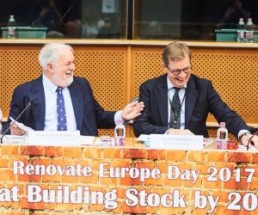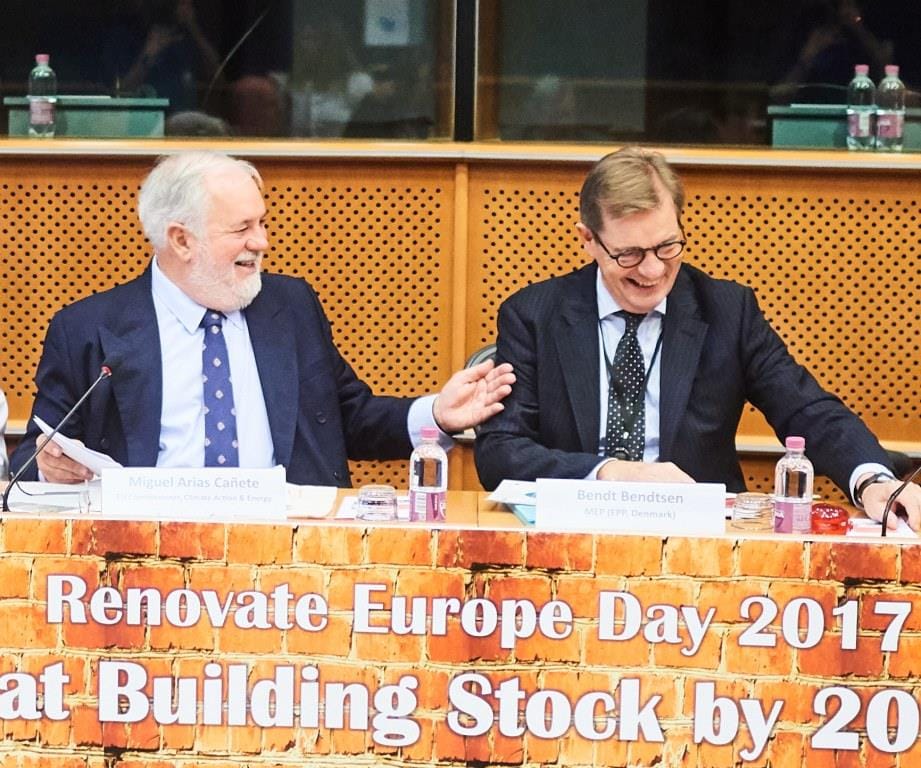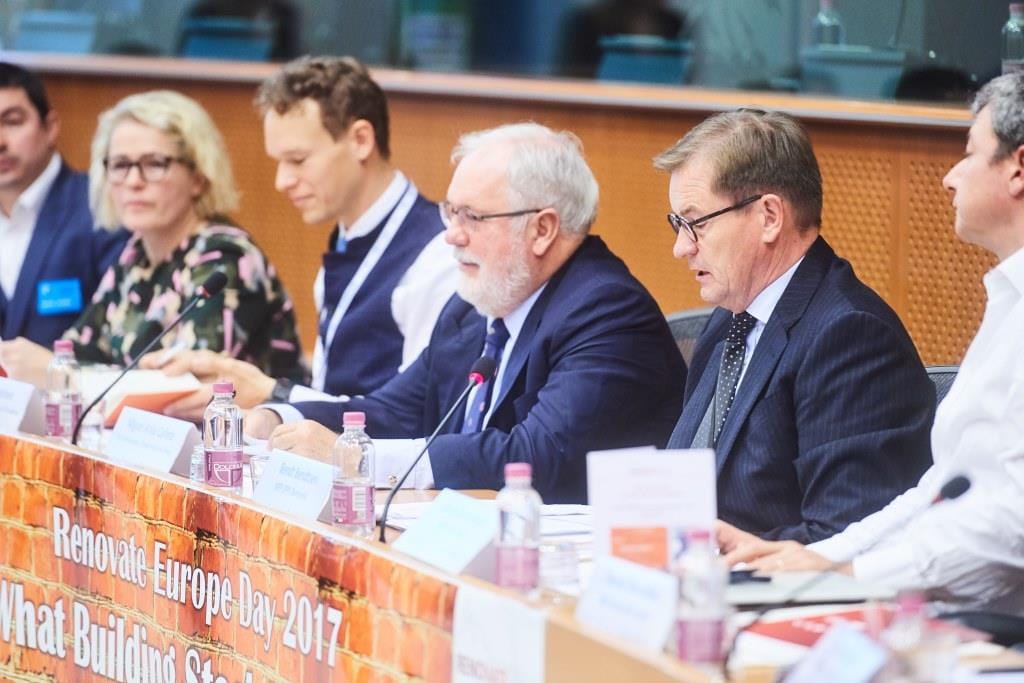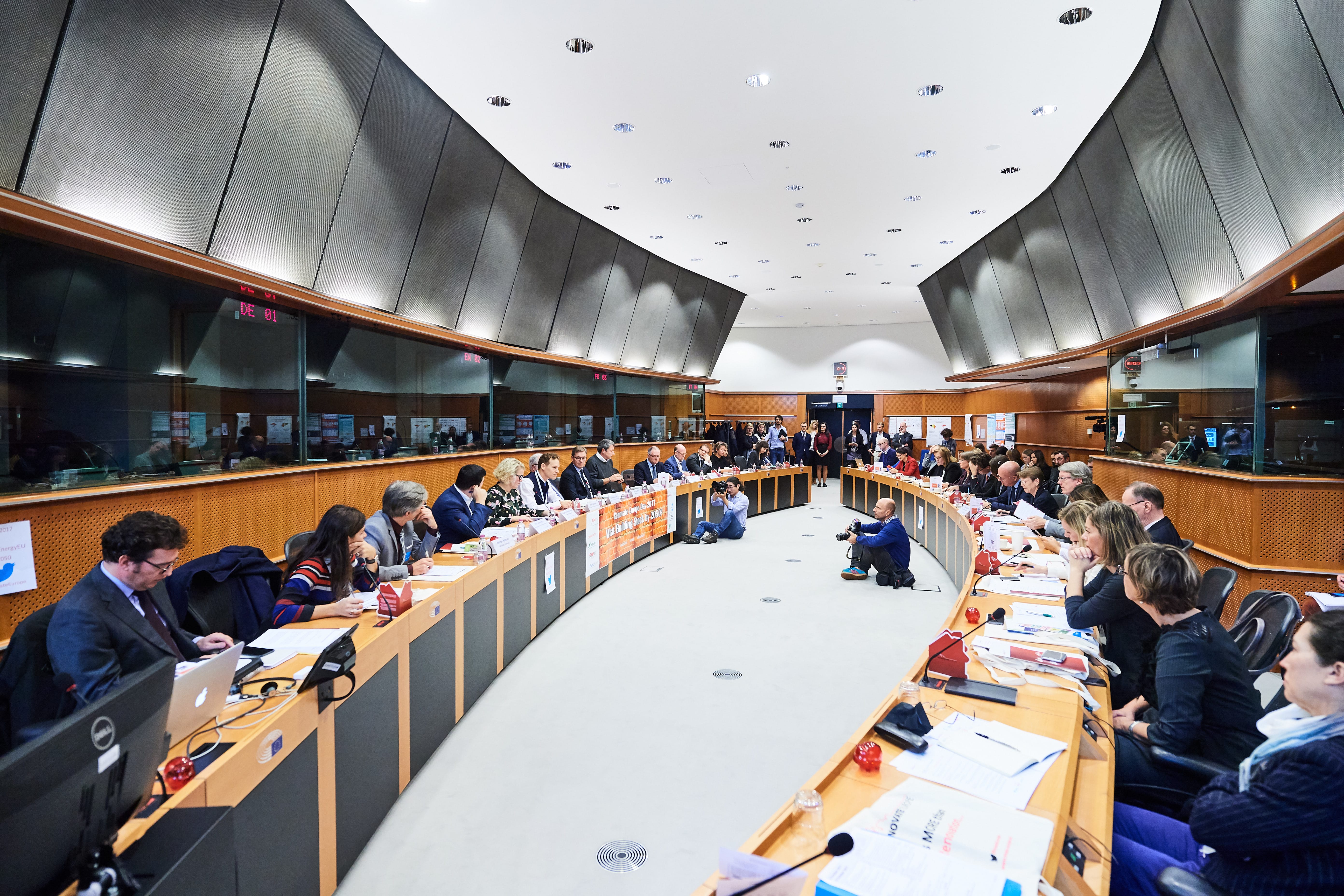Cambridge Econometrics Report presented at REDay2017
The societal and economic benefits of more ambitious legislation for energy renovation
The report 'The macro-level and sectoral impacts of energy efficiency policies', commissioned by DG Energy, was presented by Managing Director Phil Summerton from Cambridge Econometrics at REDay2017.
According to the report, more ambitious legislation for energy renovation would result in:
- Savings of €30-€80 billion in healthcare
- 8 million could be moved out of having damp mouldy homes by 2030
- 6 million could be moved out of cold homes
- Really very significant increase in employment: Boost of 2 million jobs
Download Phil Summerton's PPT presentation and Phil Summerton's presentation at REDay2017.
Learn more about REDay2017 here or watch the REDay2017 Highlights Video.
[COP23] Energy Renovations - The Climate Change Mitigator
2 November 2017 by Adrian Joyce, Renovate Europe Campaign Director

The pace of energy renovations must be urgently stepped up with a focus on delivery on the ground if the Paris agreement's climate goals are to be met, the International Energy Agency has said, as the COP23 summit prepares to open in Bonn. And the best way of doing that, might just be an aggregation mechanism that bundles diffuse projects for investors.
Renovations will be pivotal to the success of the Paris agreement's goal of limiting global warming to 2C. Buildings account for a fifth of global greenhouse gas emissions, and are among the cheapest mitigation options. Their renovation also produces immediate results.
But experts say that while there have been advances since the Paris COP21, more still needs to be done – and much more quickly.
“At COP21, the language switched from ambition to implementation,” said Brian Motherway, the head of energy efficiency at the International Energy Agency. “I'd like to see an acceleration in that direction, focused on delivery.”
“We have some concerns that while governments are designing policies and frameworks, not enough focus is being put on policy implementation and delivery on the ground,” he added.
The availability of finance, insurance and contractors is still an issue for many involved in energy renovations. “There has been some progress [since COP21],” Motherway said, “but we certainly think that the pace is not what it needs to be if we are going to meet our targets.”
At COP23, a Building Action Symposium on November 9 will offer a key platform to stocktake progress since 2015, with several reports and studies expected.
The key challenge the efficiency industry will have to grapple with is how to speed up revenue flows, according to Oliver Rapf, the executive director of Building Performance Institute Europe.
“One of our sector's biggest problems is that investment projects are normally small-scale and individual,” he said. “We need to find a mechanism to aggregate these projects and put them into a really big investment pool so that they become more interesting for institutions.”
Analysts say that fixed single ventures such as offshore wind farms often appear more attractive to pension funds and insurance companies than renovation projects, which are often perceived as small-scale, diffuse and complicated.
Returns from energy retrofits are readily achievable but paybacks from a solar park coming online are easier to gainsay than the savings from thousands of foregone energy bills, which may carry a less predictable value.
“The problem here is not availability of capital,” Motherway said. “It's the gap between the capital and the projects; the way the two sides talk to each other, how projects are bundled, and the right scale for that.”
Investors are often not well versed in the risks and returns of energy efficient renovation projects. Equally, those who deliver them may not understand investor concerns about collateral and risk management. An aggregation mechanism could help to change that.
“Confidence on both sides is an issue,” Motherway explained. “The space in between is about well designed models that have been tested, piloted and built over time to deliver confidence among all actors. I'm talking about something new here - but it is well within our capabilities.”
In countries such as France, efforts are already underway to bundle packages of up to 50 houses in single investment projects to help overcome challenges posed by the relatively small scale of the energy renovations market, and the still-maturing supply chains that they depend on.
A call in the COP conclusions for aggregation mechanisms to be set up - or a statement that the COP parties would do so - would be welcomed across the renovations sector.
“High level signals are important to activate markets and reward early adopters, perhaps using the public sector as a leader or exemplar,” Motherway said.
Another important role of the COP discussions is to share practical experiences and allow governments to learn about what works from each other, so that successful policies can be replicated.
Globally, around two thirds of homes under construction are being built with no effective application of building codes. Their future energy use – and CO2 emissions – are being locked in while policy makers are focused elsewhere.
Again, many in the building sector argue that positions taken in the final COP conclusions could have a broad-based effect on raising the profile of the issue.
“A strong endorsement or requirement that national climate strategies – the NDCs – reflect the potential in the building sector [for reducing greenhouse gas emissions] would also probably generate some momentum,” Rapf said.
END
Read more on COP: Paris agreement under threat as Member States try to water down key buildings measures in EPBD
Cañete says Paris objectives could be threatened by efficiency 'flexibilities'
Canete says Paris objectives could be threatened by efficiency 'flexibilities'
The EU's Energy and Climate Commissioner has said that "flexibilities" in the European Parliament's revised energy efficiency laws could threaten the roll-out of building renovations, which will be key to delivering the EU's Paris commitments.
Speaking at Renovate Europe Day 2017 in the European Parliament, Miguel Arias Canete said that today's vote on the revised European Performance of Buildings Directive (EPBD) was "essential" for Member States. But "the [European Council's] level of ambition falls considerably short of the European Commission on a number of points".
He continued "Buildings will unquestionably play a major role in delivering on our Paris commitments, and ultimately achieving a carbon neutral economy [but] we will not achieve our objectives without renovating our building stock."
The vote in Parliament's Industry Committee could allow houses powered by solar panels or wind turbines to be classified as more energy efficient than others, even if they are unrenovated, badly insulated, and leak heat. That would defeat the whole purpose of the renovations directive though, according to energy efficiency experts.
MEP Bendt Bendtsen, Rapporteur on the Energy Performance of Buildings Directive, said "We all agree that boosting renovations is the main ambition with the revision. To achieve this, we agree - across the political board in Parliament - that Member States must prove they will deliver on their responsibilities. Bendtsen added "We find this a reasonable expectation to have of Member States, if they are serious about enabling renovations and thereby assisting a better performing building stock to emerge".
After today's vote, two trilogues between the Parliament, Council and Commission have been scheduled to negotiate the final revised directive on November 7 and December 5.
Where the energy efficiency directive is concerned, loopholes in the annual 1.5% energy savings requirement would directly affect the EU's ability to deliver on its climate promises, according to Canete, the EU's lead representative at next month's COP23 climate summit in Bonn.
The obligation was "a core provision, as we achieve half of the directive's savings this way," Canete said. "This is the engine behind the much needed increase in building renovation."
But the flexibility that Member States have insisted on means that this energy savings figure will be half in practice. Here again, we need the European Parliament to maintain the level of ambition, not just in terms of climate numbers but also in terms of the flexibility provided."
Read Commissioner Canete's speech
END
Renovate Europe Day 2017
REDay2017 took place on Tuesday 10th October in the European Parliament.
It was co-hosted by MEP Bendtsen, MEP Kumpula-Natri, MEP Petersen, MEP Tamburrano and MEP Marcellesi, all leading the EP's work on the Energy Performance of Buildings Directive (EPBD). The keynote speaker was EU Commissioner Miguel Arias Canete.
Click here for more information about REDay2017 and previous REDays.
Op-ed: Renovation is about more than just energy savings (Euractiv)
Published by Euractiv on: 2 October 2017 | The multiple benefits of building renovation programmes include known advantages in terms of reduced energy bills and job creation. But less is known about other benefits like avoided healthcare costs, and even higher exam success rates for students, writes Adrian Joyce.
Energy Renovation contributes positively to Urban Regeneration
JOINT PRESS RELEASE
Brussels, 27th September 2017
The URBAN Intergroup and Renovate Europe organized a joint event on the topic Funding for Energy Renovation as a Stimulus for Urban Regeneration on Tuesday 26th September. The event was held in the context of the ongoing negotiations on the review of the Energy Performance of Buildings Directive, due to be voted in the EP early October, and sought to draw a link with available funding and opportunities to help Member States implement buildings-related legislation, through the Juncker Fund, the EIB and the current and possibly the next Multi-Annual Financial Framework, but also raising awareness about successful local initiatives.
"Energy renovation projects in urban areas is like inviting a whole city to go on an Easter egg hunt, to uncover the hidden treasures and multiple benefits that can be unlocked", said Claire Roumet, Executive Director of Energy Cities. "Energy renovation can completely change the metabolism of a city - the positive impacts can be so significant that it can lead to a complete urban transformation, at all levels.
MEP Jan Olbrycht, President of the Urban Intergroup, acknowledged the key role of energy renovation as an opportunity to roll-out a comprehensive urban strategy with the aim of tackling energy poverty, boosting social cohesion and triggering local jobs. But MEP Olbrycht was also keen to emphasise the need that urban regeneration be an inclusive process which preserves the patrimonial heritage and improves the quality of living for all residents involved.
"Energy renovation can and must serve as entry point to engage the local community to interact on a common discussion that goes wider than just buildings and housing, to improve quality of life for all", agreed Claire Roumet.
The redistributional value of targeted renovations is well-known, delivering undeniable benefits to lower income groups through lower energy bills and improved living standards. But this urban regeneration also occurs in skyscraper-filled business quartiers needing a much-needed human touch, or high density residential areas thirsty for more green spaces or community facilities.
"Energy renovation targets not only deprived areas", said Adrian Joyce, "Energy renovation can be the first step to boosting social cohesion, civic pride and to improve the quality of life for all different types of neighborhoods".
In terms of financing for urban energy renovation projects, speakers agreed that investment criteria need to go beyond simple profitability and short payback to include also the less tangible indicators such as improved quality of life and social benefits.
Miguel Casas from CITYnvest, emphasized the key leadership role of public partners in this respect, in order to increase the ambition and investment possibilities in energy renovation projects.
Despite the systemic challenges inherent to the energy renovation market, signals are nevertheless emerging which indicate a growing appetite for energy renovation projects on the ground. Encouraging figures from the European Investment Bank show a three-fold increase since 2012 in Energy Efficiency lending, with 75% of these funds being delivered to buildings. And minimum allocation requirements for low-carbon introduced for the EU cohesion policy funding in the 2014-2020 Multi-Annual Financial Framework have so far yielded a tripling of allocations for energy efficiency compared to the previous period, with overall allocations well beyond the minimum legal requirement, contributing among other things to an expected 875,000 renovated dwellings.
"The bottom-up push from empowered and motivated cities and regions, convinced about the multiple benefits that energy renovation can deliver to urban areas, is an important factor that can drive the energy renovation market", explained Lambert Van Nistelrooij, Vice-President of the URBAN Intergroup. "The role of cities and local authorities is increasingly gaining prominence, as they are the ones who witness first-hand the positive domino-effect from energy renovation projects."
END
DOWNLOAD THE FULL PRESS RELEASE
#URBANIntergroup @RenovateEurope
Relevant documents:
For more information about the event and to download the PPT presentations: Funding for Energy Renovation as a Stimulus for Urban Regeneration
Download the Renovate Europe Briefing: Energy Renovations Benefit Communities, not Speculators
-------------------------------------------------------------------------------
About Renovate Europe
Renovate Europe is a political communications campaign with the ambition to reduce the energy demand of the building stock in the EU by 80% by 2050 compared to 2005 levels through legislation and ambitious renovation programmes. This will bring the energy performance of the entire building stock in the EU to a Nearly Zero Energy (NZEB) performance level. Renovate Europe brings together 36 partners from across the building value chain (trade associations, companies, trade unions, city networks and 14 national partners). Learn more: www.renovate-europe.eu @RenovateEurope
About the URBANIntergroup
The URBAN Intergroup at the European Parliament is a cross-parties and cross-committees grouping with a horizontal approach to discuss urban related issues. We bring together over 89 MEPs representing most EU Member States, all the political groups at the European Parliament, and working in all the parliamentary committees. We work with 118 partners from local, regional, national and European level that represent the interests of Europe's town and cities or work in the domain relevant for urban development.
Learn more: http://urban-intergroup.eu/ #URBANIntergroup












